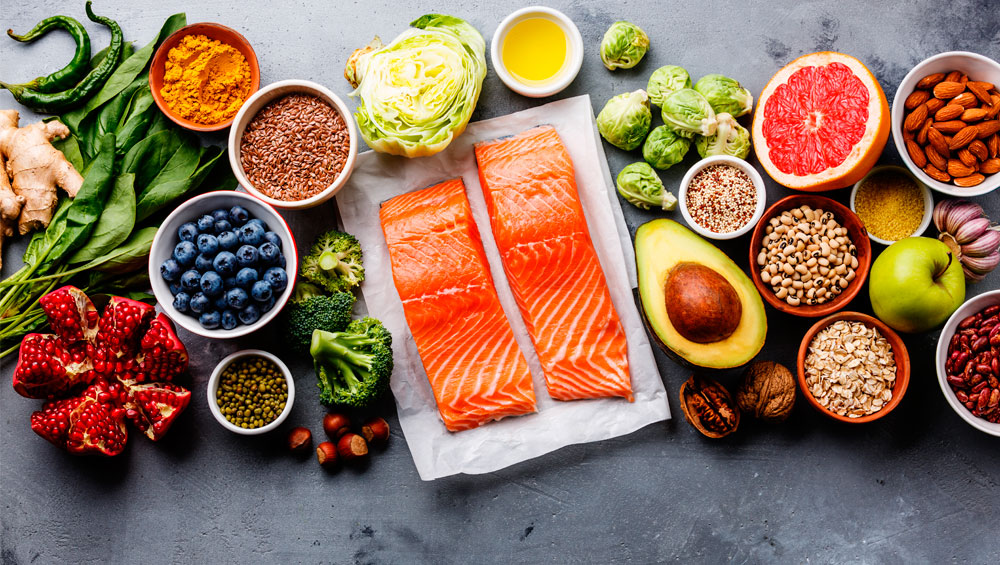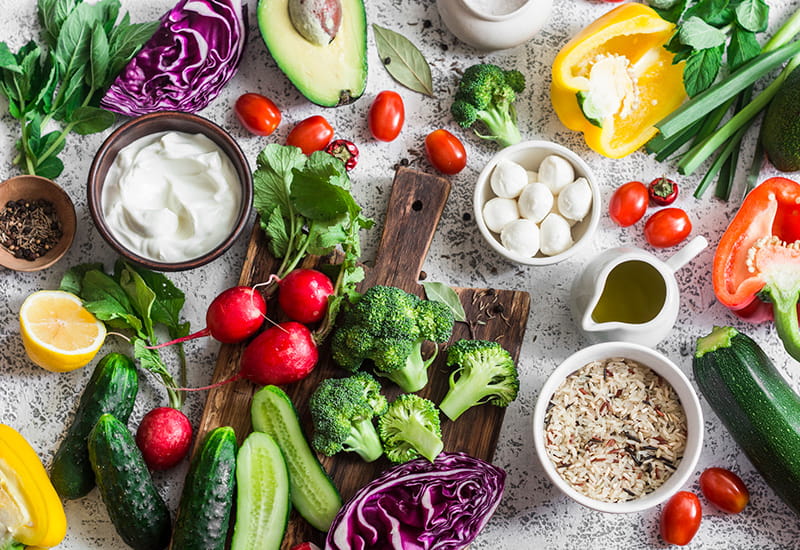
A vegetarian diet is an excellent choice, whether you want to improve your health or just to protect the environment. Vegetarians typically have a healthier lifestyle than non-vegetarians, and can live longer. Pregnant women and mothers who are breastfeeding need to be aware of the importance of a balanced diet. It can also provide adequate nutrition for children.
Take into consideration a variety fruits, vegetables, nuts, and whole grain options when you are preparing your meals. Processed foods are also unhealthy and can cause you to eat a lot of calories. Vegetarians need to ensure that they eat protein- and calcium-rich food. Dairy products and eggs are two of the best sources of protein. Calcium is also abundant in dairy products.
In addition to eating a wide variety of vegetables, fruits, and grains, vegetarians should consume more fiber. Fiber can help you feel fuller and lose weight. Saturated fats and salt should be reduced in vegetarians. Vegetarians need to replace saturated fat with good fats such as olive oil and nuts.

In addition to eating a variety of foods, vegetarians should be sure to supplement their diets with vitamin B12. This vitamin can only be found in animal products and is essential for red blood cell development. An older vegetarian may have a reduced ability to absorb this vitamin. You might need to supplement your diet. This vitamin is crucial for healthy brain development, so make sure you have enough.
A vegetarian should ensure they have enough vitamin D. This can cause anemia or rickets. Vitamin D can be obtained by eating foods that are fortified with vitamin, such as fortified cereals for breakfast. A vitamin D supplement is another option.
Iron is another important nutrient. Iron is crucial for healthy red cells. You can get iron from dried beans and peas, enriched cereals, and dark leafy green vegetables. You should also consume vitamin C, which is needed to help your body absorb iron.
Registered dietitians can help you if your goal is to become a vegetarian. Registered dietitians will help you create a vegetarian diet that meets all your nutritional needs. They can also help you stay on track with your daily calorie intake and offer advice on supplements if necessary. Find a registered dietitian in your area using the Academy of Nutrition and Dietetics' Find a Nutrition Expert database. Forks Over Knives also has vegetarian recipes and meal planning. This site offers recipes, meal planning, and a newsletter. It also educates the public on the health-benefits of a vegetarian diet.

Supplements with vitamin D should be taken by vegetarians. Getting enough vitamin D is important for healthy bones and teeth, as well as for optimal brain development in babies. Vegetarians should ensure they eat five to six servings of vegetables and fruits per day. They also need to be mindful of their saturated fat and salt intake.
FAQ
How often should you exercise?
Exercise is essential for maintaining a healthy lifestyle. There is no set time limit for exercising. The key is finding something you enjoy and stick with it.
If you work out three times a week, then aim to complete 20-30 minutes of moderate intensity physical activity. Moderate intensity means you'll be breathing hard long after you're done. This type of exercise burns approximately 300 calories.
Walk for 10 minutes four days a semaine if you prefer walking. Walking is low-impact and easy on your joints.
Jogging for 15 minutes three days a week is a good option if you prefer to run. Running can help you burn calories and to tone your muscles.
Begin slowly if your are new to exercising. You can start with only 5 minutes per week of cardio. Gradually increase the time you do cardio until your goal is reached.
Exercise: Is it good or bad for immunity?
Exercise is good for your immune system. Your body makes white blood cells that fight infections when you exercise. Your body also gets rid of toxins. Exercise helps prevent diseases like cancer and heart disease. Exercise can help reduce stress.
Exercising too often can cause your immune system to be weaker. If you work out too hard, your muscles become sore. This can cause inflammation and swelling. To fight infection, your body will produce more antibodies. Problem is, extra antibodies can trigger allergies and other autoimmune conditions.
So, don't overdo it!
What is the problem in BMI?
BMI stands For Body Mass Index. It is a measurement of body mass based on height and/or weight. The following formula can be used to calculate BMI.
Weight in kilograms divided with height in meters.
The result is expressed using a number from 1 to 25. A score greater than 18.5 is considered overweight. A score greater than 23 is considered obese.
A person with 100 kg will have a BMI 22 if they are 1.75m tall and weigh 100 kg.
What can I do to lower my blood pressure?
Find out the causes of high blood pressure first. Then, you can take steps to lower your blood pressure. These could include eating less salt and losing weight if needed, as well as taking medication if necessary.
It is important to ensure that you get enough exercise. If you don't have time for regular exercise, then try walking as often as possible.
If you are unhappy about how much exercise you do, you might consider joining a fitness club. A gym that has other members who share your goals will be a good place to start. It's easier to stick to an exercise routine when you know someone else is going to see you at the gym.
Statistics
- WHO recommends reducing saturated fats to less than 10% of total energy intake; reducing trans-fats to less than 1% of total energy intake; and replacing both saturated fats and trans-fats to unsaturated fats. (who.int)
- In both adults and children, the intake of free sugars should be reduced to less than 10% of total energy intake. (who.int)
- This article received 11 testimonials and 86% of readers who voted found it helpful, earning it our reader-approved status. (wikihow.com)
- According to the Physical Activity Guidelines for Americans, we should strive for at least 150 minutes of moderate intensity activity each week (54Trusted Source Smoking, harmful use of drugs, and alcohol abuse can all seriously negatively affect your health. (healthline.com)
External Links
How To
10 tips to a healthy lifestyle
How to maintain a healthy lifestyle
We live in a fast world where we don't get enough sleep, eat too much, drink too much alcohol and smoke cigarettes. We don't properly care for our bodies.
When you work full time and have to balance your exercise and diet regimens, it can be hard to create a healthy lifestyle. It's even more difficult when you're stressed because your mind tells you that it is impossible to handle this situation so you start feeling guilty about it and give up.
You should feel something is wrong with you body. Ask your doctor for his/her opinion about your current situation. If nothing is abnormal, it might be stress due to your job.
Some people believe they're lucky because their jobs let them go to the gym on a regular basis or they have friends who encourage them to stay fit. However, those people are really lucky. They don't have problems. They have everything under control. I wish every person could be like them. Most people don't know how balance work and life. Many people fall prey to bad habits, which can eventually lead them to developing diseases like heart disease, diabetes and cancer.
These tips might help improve your lifestyle.
-
Get enough sleep, minimum 7 hours, maximum 8 hours. This means sleeping properly and not consuming caffeine in the hour before bed. Caffeine blocks the melatonin hormones making it hard to fall asleep. Make sure your bedroom's dark and clean. You should use blackout curtains if possible, especially if your work is late at night.
-
Eat healthy. Have breakfast every morning. Avoid sugar products, fried foods and white breads. For lunch, try to include fruits, vegetables and whole grains. It is recommended that afternoon snacks be high in fiber and protein, such as nuts and seeds, beans, fish, and dairy products. Avoid unhealthy snacks such as chips, chocolates, cookies and cakes.
-
Get enough water. Many people don't get enough. Water helps us burn more calories and maintains our skin's youthfulness. It also flushes toxins out of our bodies and improves our digestion. You can lose weight by drinking six glasses of water per day. Your urine color is the best way to determine your hydration levels. Yellow means dehydrated; orange means slightly dehydrated; pink means normal; red means overhydrated; and clear means highly-overhydrated.
-
Exercise - Regular activity can increase energy and decrease depression. Walking is a good way to get fit and improve your mood. Even though walking looks simple, it requires effort and concentration. Your brain must be able to focus on the act of walking while you breathe slowly and deeply. For between 100 and 150 calories, a 30 minute walk can be enough to burn about 100 to 150 calories. Slowly increase the pace. Stretching is key to preventing injuries.
-
Be positive - Positive thinking is essential for mental health. If we are positive, we create a happier environment in our minds. Negative thoughts drain our energy and cause anxiety. Try to visualize the things you are aiming to achieve. Reduce the number of tasks you have to do in order to feel less overwhelmed. Be aware that you will fail at times, but don't despair. Just get back up and start over.
-
Learn to say no. Too many people are so busy they don't even realize how much wasted time they waste on unnecessary tasks. It is important to be able to say No when needed. However, saying no does not necessarily mean you are rude. A No means that you can't take care of something now. There will always be another way to do the job. Try to set boundaries. You can ask someone to help you. This work can be delegated to someone else.
-
Take care of your body - Keep track of your diet. Eating healthier foods will boost your metabolism and help you shed those extra pounds. Do not eat anything too heavy or oily because they tend to raise cholesterol levels. A good tip is to have three meals and two snacks daily. Around 2000 to 2500 calories should be consumed each day.
-
Meditate - Meditation is a great stress reliever and reduces anxiety. Relax your mind by sitting still with closed eyes. This will help you make better decisions. Practicing meditation regularly will make you calmer and happier.
-
Breakfast is the most important meal you should eat each day. Skipping breakfast can lead to eating too much lunch. It's never too late for a healthy breakfast, as long as it is eaten within an hour of your waking hours. Breakfast can increase your energy level and help you to manage your hunger.
-
Good food is healthy. Avoid junk food and any food products that contain artificial ingredients or preservatives. These foods make your body feel acidic, and can cause you to crave them. Vitamins and minerals found in fruits and vegetables can improve your overall health.
-
***